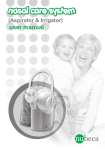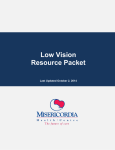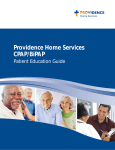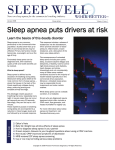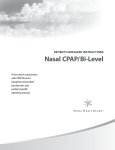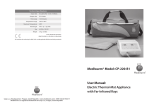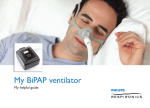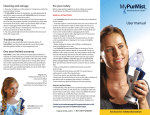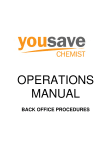Download WHAT IS CPAP (Continuous Positive Airway
Transcript
WHAT IS CPAP (Continuous Positive Airway Pressure)? CPAP, or continuous positive airway pressure, is a treatment that uses mild air pressure to keep your throat open while you sleep. CPAP is used for people who stop breathing while asleep, a sleep disorder called “Sleep apnea.” This treatment is done using a CPAP machine. CPAP machines have three main parts: • A mask or other device that fits over your nose or your nose and mouth. Straps keep the mask in place while you're wearing it. • A tube that connects the mask to the machine's motor. • A motor that blows air into the tube through a heated humidifier which prevents irritation due to dry air by adding water (humidity). CPAP machines are small, lightweight, and fairly quiet. CPAP is the most effective treatment for obstructive sleep apnea. In obstructive sleep apnea, your throat muscles relax causing a blockage. The blockage may cause shallow breathing or breathing pauses. When you try to breathe, any air that squeezes past the blockage can cause loud snoring. Your snoring may disrupt others. The mild pressure from CPAP can prevent your airway from collapsing or becoming blocked. If your doctor prescribes CPAP, you will work with a CPAP provider such as Mainland Sleep Diagnostics to be fitted for a CPAP unit. Mainland Sleep Diagnostics will work with you to make sure the settings for your CPAP machine are correct. We will verify that the pressures set on the CPAP unit are sufficient enough to keep your throat open during the night. A repeat overnight oxygen test will be done at home with the CPAP mask applied to confirm you no longer have drops in oxygen during your sleep. There are many different kinds of CPAP machines and masks. Mainland Sleep Diagnostics will provide you with masks that are the most comfortable for you during your trial. BENEFITS OF CPAP CPAP has many benefits. It can: • Keep your airways open while you sleep • Correct snoring so others in your household can sleep • Improve the quality of your sleep • Relieve symptoms of sleep apnea, such as excessive daytime sleepiness • Decrease or prevent high blood pressure and help control your blood sugars Many people who use CPAP report feeling better once they begin treatment. They feel more attentive and better able to work during the day. They also report fewer complaints from bed partners about snoring and sleep disruption. SELECTING A CPAP MACHINE AND MASK CPAP units come with many features designed to improve fit and comfort. Your CPAP provider will help you select a machine based on your prescription and the features that meet your needs. You will be provided a CPAP unit for a trial period to make sure you're happy with your choice. There are many types of CPAP masks. The fit of your mask is important, not only for comfort, but also to keep air from leaking out. A mask that fits will help maintain proper air pressure and keep your airways open. CPAP masks come in different shapes, sizes, and materials. Some fit over your nose and mouth; others only cover your nose. Nasal pillows may be used instead of a mask. Nasal pillows are small, flexible, mushroom-shaped cones that fit into each nostril. Eye glasses can be worn with most pillows masks. Let your CPAP provider know whether your sleep on your back, side, or stomach. Different types of plastic tubing connect the mask to the CPAP machine. Some types may make it easier for you to sleep on your side or stomach. WHAT TO EXPECT WHILE USING CPAP THERAPY WITH MAINLAND SLEEP DIAGNOSTICS DURING A CPAP TRIAL CPAP is a long-term treatment. Many people have questions when they first start using CPAP. Our therapists and nurses will do our best to answer any questions or concerns. We will also arrange a follow up appointment within the first 2 weeks to ensure you are comfortable with your therapy and do another oxygen test with your CPAP therapy to ensure treatment is effective. At this time we may change masks or re-educate you on your unit to ensure you are comfortable with using your therapy. To achieve the full benefits of CPAP, use it every time you sleep—during naps and at night. Most people should use CPAP for at least 7.5 hours each night for the best results. RISKS OF CPAP THERAPY CPAP is a safe, painless treatment. Side effects and other problems usually are minor and can be treated or fixed. Talk to your doctor if you're having problems using CPAP. He or she can suggest ways to handle or treat these problems. Although these problems can be frustrating, stick with the treatment. The benefits of CPAP are worthwhile. SIDE EFFECTS Mask Allergies and Skin Irritation CPAP masks may cause skin allergies or skin irritation. If this happens, we will provide a different mask. CPAP masks come in different shapes, sizes, and materials. Some have fewer straps and less contact with your face. Certain masks may irritate your skin less than others. If you have trouble finding a mask that works for you, talk to your sleep specialist about nasal pillows. These are small, flexible, mushroom-shaped cones that fit into each nostril. Dry Mouth Dry mouth may be due to the CPAP itself or from breathing through your mouth at night. A CPAP machine that has a heated humidifier may help relieve this side effect. If dry mouth persists, we may recommend a chin strap to keep your mouth closed or a different type of mask that covers both your nose and mouth allowing you to breathe through your mouth. Talk to your sleep specialist if dry mouth continues. It may mean that your mask is leaking air. The air may be going into your open mouth and causing dry mouth. Congestion, Runny Nose, Sneezing, Sinusitis, and Nosebleeds Congestion, runny nose, sneezing, sinusitis, and nosebleeds can occur while using CPAP. A CPAP machine that uses a heated humidifier can help relieve these side effects. Also, make sure that your humidity level is set appropriately and the mask fits properly. Some people find that using a saline nasal spray at bedtime prevents these side effects. If these steps don't work, talk to your sleep specialist. He or she may prescribe a steroid nasal spray. Stomach Bloating and Discomfort Stomach bloating and discomfort may be due to a problem with the air pressure setting of your CPAP machine. If you have stomach bloating and discomfort, talk to us. We may adjust the settings of your machine to relieve these side effects. LIVING WITH CPAP CPAP is a long-term treatment. To achieve the full benefits of CPAP, use it every time you sleep—during naps and at night. Most people should use CPAP for at least 7.5 hours each night for the best results. CPAP machines are small, lightweight, and fairly quiet. It's possible to take your machine with you when you travel. Knowing how to maintain your CPAP machine is important. Mainland Sleep will routinely send newsletters and reminders to bring in your CPAP unit for servicing and downloads of the memory card to ensure adequate treatment. MAINTAINING/CLEANING YOUR CPAP MACHINE It's important to properly maintain your CPAP machine. Refer to the user manual or use the instructions below: It is recommended you use DISTILLED water with your humidifier. Distilled water is used to protect the patient from breathing pollutants, minerals and other bacteria. MASK (Daily) Clean the surface of you mask daily with a wet face towel or wipes that are safe for the skin. (Do not use kitchen/bathroom wipes as these contain chemicals that are not meant to be for the skin or inhaled) MASK, TUBING AND WATER CHAMBER (Weekly) Remove your head gear from your mask and soak your mask, tubing/hose, and water chamber once a week in your kitchen sink or bucket in warm, soapy water. Soak for 30 minutes, wipe down any surface, rinse and air dry. (Use mild unscented dish soap) FILTER AND HEADGEAR (Monthly) Hand wash your filter and headgear once a month or as needed with mild soapy water and let air dry. If you suspect a problem with your CPAP machine, call your CPAP provider. Don't try to fix it yourself. There's a small hole in most masks that lets the air that you exhale out and keeps the air supply fresh. This isn't a defect in the machine, and you shouldn't try to cover it. WHEN DO I PURCHASE THE CPAP UNIT and ACCESSORIES After your therapy has been optimized and your trial period is coming to an end, it would be a good idea to make plans for purchasing the CPAP unit. Mainland Sleep Diagnostics will request any information required or sleep reports needed to submit to your extended health company or medical equipment assistance provider. At this point, your specialist or family physician would have received post testing results showing the effectiveness of your therapy. It is always a good idea to check with your extended health company to ensure you have coverage. Many plans differ on how much coverage or maximums they may have. What if I do not have any extended health coverage? At this time, MSP or Pharmacare does not cover the cost of CPAP units/accessories in the province of British Columbia. Mainland Sleep Diagnostics will work with our patients for an affordable option. ONGOING CARE WITH MAINLAND SLEEP DIAGNOSTICS Many people have questions when they first start using CPAP. Talk to us about any concerns or questions that may arise. Mainland Sleep will provide follow up appointments on a regular basis or as needed to ensure compliance with your therapy. During follow up visits, we may need to adjust the air pressure setting of your CPAP machine or repeat an oxygen test if: • You gain or lose a lot of weight • Your symptoms, such as daytime sleepiness, persist or recur • You have another treatment for sleep apnea, such as upper airway surgery or a mouthpiece During follow up visits, be sure to tell your CPAP provider or specialist if you’re not happy with your CPAP machine. He or she may suggest switching to a different machine or other treatment options that may work better for you. OTHER SLEEP HYGIENE TIPS TO HELP OPTIMIZE SYMPTOMS It is important to remember that CPAP therapy will effectively treat your sleep apnea. However, some individuals do not feel significantly well rested and have expectations that CPAP therapy will give them more energy. Most people do feel an immediate positive response while using CPAP therapy but to improve symptoms even more please try and follow these tips: Habits Try and set a regular bedtime schedule and awake time schedule Get enough sleep with CPAP (Greater than 7.5 hours) Avoid Alcohol 6 hours before going to sleep Avoid caffeine at least 6 hours before going to sleep Avoid eating heavy, spicy and sugary foods at least 6 hours before going to sleep Avoid exercising 2 hours before going to sleep Environment Have a comfortable bed or bedding Avoid noisy sleep environments Find a room temperature that allows you to fall asleep and stay asleep Preparing for Bed time Try and clear your mind of stress or worries Set a regular routine such as reading (avoid television) or taking a warm bath Try relaxation methods such as deep breathing or yoga Thank you for allowing Mainland Sleep Diagnostics being involved with your care.







